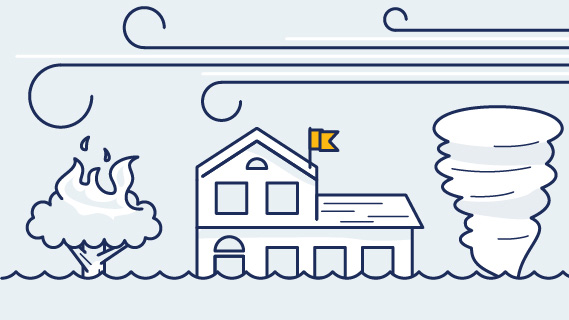Every year, September marks National Preparedness Month, FEMA’s Ready Campaign and the Ad Council’s month-long movement to raise awareness about the importance of being ready for unexpected emergencies.
While preparedness can encompass various aspects of life, at Recoop Disaster Insurance, we tend to look at it through the lens of home insurance and natural disasters. In this article, we’ll delve into why National Preparedness Month serves as a great reminder to have guardrails in place to build your home’s, your family’s and your bank account’s resilience in the face of a disaster.
Expect the Unexpected
One thing you can count on is that Mother Nature can be unpredictable. Just in 2025, we’ve seen rare snowstorms in the South, early winter wildfires on the West Coast, and more, meaning no one is immune to severe weather. In fact, between 2011 and 2024, counties representing 95.5% of the U.S. population declared a natural disaster, according to Rebuild by Design.
That’s why it’s important to adopt preventative measures to reduce your exposure to the devasting effects of severe weather. Depending on what type of climate you live in, consider making the following upgrades to your home:
- Installing fire-resistant roofing materials
- Reinforcing your windows and doors with hurricane and/or flood shutters
- Trimming trees regularly and removing debris from your lawn so they’re a safe distance from your home
- Ensuring your attic is insulated and ventilated
- Clearing out gutters of leaves and debris often
Taking these steps and others not only enhances the safety of your household but can also lead to lower insurance premiums.
Stay Informed and Educated
During National Preparedness Month, communities often host workshops and events to educate homeowners about disaster preparedness. These events provide an opportunity to learn about evacuation plans, emergency contact information, and other critical resources relevant to your area. Check out local events in your area so you can receive the knowledge you need to respond effectively when disaster strikes.
But What About My Insurance Policy?
You may be thinking that you’re covered because you have an insurance policy in place. But you better think again. While traditional insurance can cover some of the cost of repairs, replacement belongings and more, it oftentimes falls short for many homeowners.
It’s estimated that two out of every three homes are underinsured by 22% on average, which typically means homeowners are left picking up the tab. Putting life back together post-disaster is stressful enough, when your insurance leaves you hanging, it adds just another obstacle in your way to recovery.
Disaster Insurance as a Safety Net
Enter: Recoop Disaster Insurance. Designed to pick up where traditional insurance leaves off, Recoop gives homeowners access to flexible funds (up to $25,000 – cha-ching!) in a lump-sum cash benefit after a disaster. This money is designed to help cover the cost of displacement, supplies or whatever you need to recover from disaster.
Here’s how it works – homeowners enroll in a supplementary disaster insurance policy via Recoop. You set up the account, upload current photos of you property and then choose your preferred payment type. After a declared disaster in your county (say, a hurricane, tornado or winter storm), folks file their claim online by posting photos of the damage. From there, recovery cash hits your account in about two business days.
So, instead of waiting 30 days (or more) for a payout from your insurance policy, you can start getting back on your feet quickly. By providing fast access to flexible recovery funds, we help empower homeowners to bolster their financial resilience in the wake of severe weather.
National Preparedness Month serves as a timely reminder that uncertainties are a part of life. As you consider how to protect your home and loved ones, remember that having a comprehensive insurance plan, designed to suit your region and needs, is essential for your preparedness strategy. Use this month to fortify your home against severe weather, assess your insurance coverage and bolster your financial resilience to handle whatever Mother Nature may throw your way.

